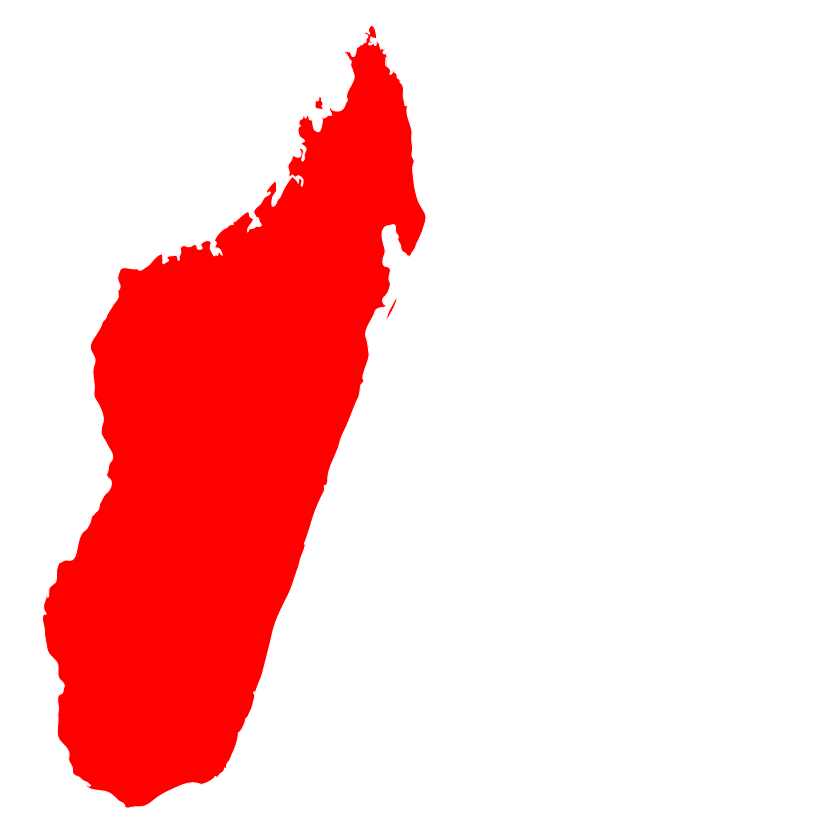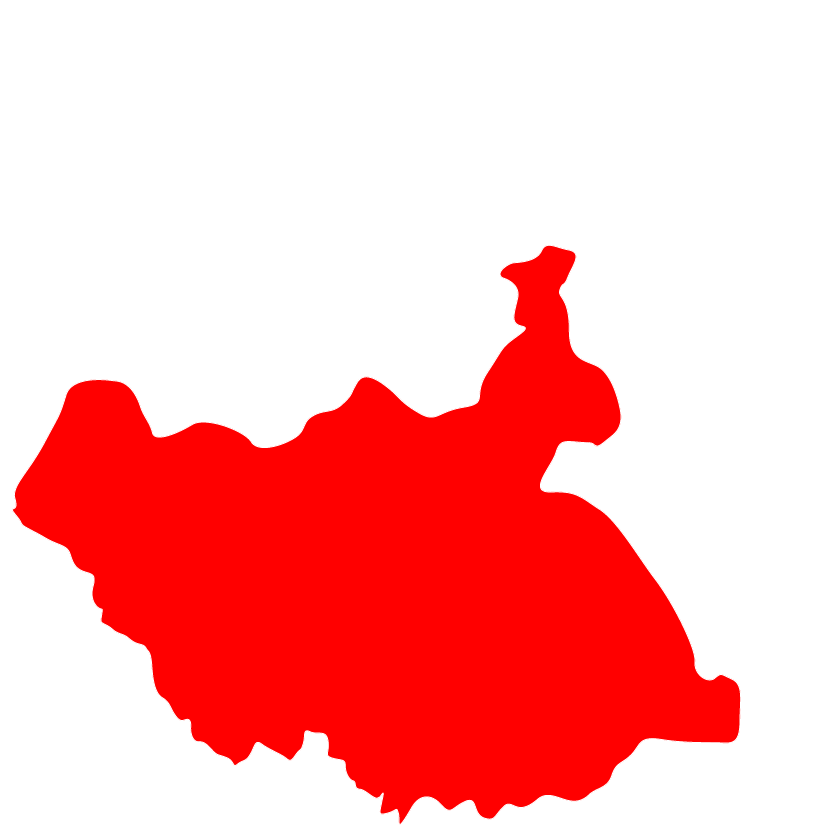Madagascar: Cylone Belna.

In the afternoon of Sunday the 8 December 2019, cyclone Belna passed the region of the entire western coastline in Madagascar. While the eye of the cyclone moves near to the coast in the channel between Mozambique and Madagascar, the coastal areas of Madagascar are getting affected with heavy rains and wind up to 200 km/h.
The entire catchment of cyclone Belna has actual a width of 200 km and a rotating wind speed of approximately 150 km/h which is still speeding up (source Metrological Department for Madagascar). As a result, the northwest of Madagascar is experiencing heavy rains and strong winds with a high possibility of flooding affecting very isolated areas with challenging road access. Tropical Cyclone Belna will bring impacts to Madagascar into the middle of the week and strong winds can result in damage to homes and cause significant power cuts and tree damage.
The cyclone is foreseen to develop up to category 4 and will touch land on December 9th somewhere between Mahajanga and Tulear, situated in the West / South West of Madagascar and pass the Southern part of the Island before leaving on the open Indian Ocean.
ACT Madagascar Forum members are planning to submit a funding request to respond to affected communities.
Madagascar_Cyclone Belna.

Moderate to heavy Deyr seasonal rains, which started in early October in many parts of Somalia have continued to be received across the country.
The regions of Gedo, Nugaal and Hiran in Somalia are the most affected, with these regions heavily flooded.
Recent updates by Somalia NGO consortium indicate that over half a million people have been affected by floods and an estimated 370,000 people have fled homes submerged in floodwater.
The Ethiopian highlands, where the Juba and Shabelle rivers originate, also received moderate to heavy rains over recent weeks causing flooding in the neighbouring districts according to FAO-Managed Somalia Water and Land Information Management (SWALIM). Farmland, schools, homes and roads have been destroyed, and livelihoods disrupted in some of the worst-hit areas.
ACT Somalia Forum members (DKH and NCA) are planning to submit an appeal in response to supporting affected communities.
Somalia_ Floods Alert.
South Sudan: Floods Emergency

The South Sudan States of Upper Nile, Jonglei, Unity, Northern Bahr el Gazal and Eastern Equatoria have been seriously affected by flooding, caused by heavy continuous rains.
On October 27, 2019, the government of South Sudan declared the flooding situation a state of emergency in most affected areas. The floods have affected over 900’000 people with estimated 420’000 people displaced and in need of immediate emergency assistance.
In addition, the floods have destroyed 20,000 metric tons of food, caused houses, water points, pit latrines, and school shelters to collapse. Infrastructure damage has been caused, and livelihoods (crops and livestock) have been swept away. Affected populations are hindered access to basic services by the floods (UN OCHA-Report November 5, 2019).
The Government, United Nations and Non-governmental organizations are responding to the immediate needs of affected persons and coordinating a response in affected locations.
Affected communities face problems of access and availability of food, safe shelter & Non Food Items. Diseases like malaria and water-borne diseases are a threat due to the breeding of mosquitoes and contamination of water because of submerged pit latrines and poor sanitation.
South Sudan ACT forum members will submit an appeal in response to floods.
Alert_Floods_South Sudan

Kenya has experienced heavy rains in the recent months across the country, affecting over 144,000 people in 25 counties.
According to preliminary findings by the Kenya Red Cross Society and the Government’s National Disaster Operation Centre (NDOC), the floods have claimed the lives of 48 persons, left 17,000 people displaced and also affected 200,000 refugees living in settlements in Dadaab. With the current weather forecasts, which predict heavy rains until the end of November, the NDOC expects these numbers to rise.
Affected villages and farms are submerged, causing massive displacement of families, and livestock. Crucial livelihoods of undetermined acreage are destroyed, which will heavily affect the food security situation across the country. Affected communities are exposed to water-borne diseases, and require food, shelter and safe water.
ACT Kenya forum is planning to submit a funding proposal to support flood-affected communities in Kenya.
Kenya_Flood Emergency
Philippines: Cotabato Earthquake
A 6.5 magnitude earthquake hit the province of Cotabato in the Philippines in the morning of 31st October, 2019. The province has experienced two earthquakes of more than 6.0 magnitude since 16th October and they expect that aftershocks and tremors will still continue until December, as reported by Philippine Institute of Volcanology and Seismology (PHIVOLCS).
As of October 31, over 30,045 people are affected in 72 barangays or villages in Regions XI and XII, of which almost 12,800 are in 19 evacuation centres, while 6,850 are staying with host families according to the National Disaster Risk Reduction and Management Council (NDRRMC). A total of fifteen deaths, 610 injured and 2 missing persons were reported due to the October 16 and 29 earthquakes. Over 2,600 homes and about 513 schools, frequently used as evacuation centers, sustained damages in Region IX, X, XI, XII, and the Bangsamoro Autonomous Region in Muslim Mindanao (BARMM). Secondary hazards were monitored in the said regions such as fire, flooding due to dike damages, and landslides causing isolation of some communities, among others. Affected communities, displaced in evacuation centers, with host families or camping outdoors in makeshift tents are afraid to go indoors for fear of being injured.
The National Council of Churches in the Philippines will access ACT Alliance’s Rapid Response Fund to provide food, sleeping materials, shelter repair kits, drinking water, and psychosocial first aid to the affected people.
Alerts Cotabato Earthquake

Heavy rains for eight continuous days have caused havoc in the Upper East Region in Ghana, resulting in loss of life, injured and displaced persons. At least 20 people have lost their lives and 19 are reported injured.
More than 1,550 houses have also been destroyed by the floods across the 15 most affected districts of the region.
The Ghana National Disaster Management Organization (NADM)) is currently coordinating the response.
The flood-affected communities find themselves in a desperate situation, with many unmet vital humanitarian needs such as access to Shelter, WASH, Early recovery/livelihoods, food security, Protection and Psychosocial support.
The ACT Ghana forum is planning to submit a funding proposal to contribute towards providing unmet needs of affected persons.
Ghana_Flood Alert.
Typhoon Hagibis made landfall to Japan on 12th October 2019, and widespread flooding and landslides were observed in many parts of central Japan. In two days, the typhoon brought 30-40% of the annual rainfall, and maximum category of warning (category 5: do whatever it takes to save your lives) have been issued to 13 prefectures. Evacuation warning was given to more than 7 million people. In many areas, a record-high rainfall was observed. As of 14th October, 61 people have died; 15 missing; and 211 injuries reported (based on reports from Japan’s news agencies). Over 300,000 houses are out of electricity. 181 rivers in 8 prefectures breached, and water inundation still continues.
ACT Japan Forum through Church World Service (CWS Japan) and the National Christian Council in Japan (NCCJ), are communicating closely with its partners particularly in Tateyama city of Chiba prefecture and Fukushima prefecture, and discussions are ongoing on collaborative response within ACT Forum Japan, including emergency supplies and skilled labor force to assist the recovery process of the vulnerable households – particularly elderly households without younger members of the family. NCCJ may access ACT’s Rapid Response Fund.
Alerts Japan Typhoon Hagibis
Pakistan: Kashmir Earthquake
In the afternoon of Tuesday, 24 September 2019, the district of Bhimber, Mirpur and Jhelum in Azad Jammu Kashmir and Punjab, Pakistan, was badly struck by an earthquake of magnitude 5.8 that killed 39 people injuring 746 others. Government reported 454 houses including 135 severely and 319 have been partially damaged.
Based on reports from other NGOs, it is estimated that around 9,000 families have been affected. About 1,000 houses have been destroyed out of the 7,000 damaged houses in Mirpur district alone. Aftershocks continues to rock the region, many left their homes and spent the night on the roadside or in parks. Infrastructure including houses, roads, mobile phone towers and electricity poles have been badly damaged and communication channel both through roads and telephones to some of the affected areas has been cut off. Information is still scarce as some areas are still inaccessible.
Community World Service Asia (CWSA) plans to access ACT Alliance’s Rapid Response Fund to provide food, water, shelter and household needs.
Alert Kashmir Earthquake
Zimbabwe: Drought Emergency.
Zimbabwe is currently facing a severe drought caused by poor rains that affected food harvests between October 2018 and May 2019. In August 2019, the government declared the 2018/19 drought and cropping season “a State of National Disaster” and appealed for international humanitarian assistance. Reports from WFP estimate that at least 2 million people are affected.
The prices of staple food (maize) have increased by 31 per cent higher compared to the same time last year. The severe drought crisis is coupled with an economic crisis caused by the uncertainty that arose after the pronouncement of the Statutory Instrument 2019 -142 that pronounced the Zimbabwean Dollar to be the sole currency for legal tender purposes; creating some ambiguity as the currency is facing shortages and limiting household market access hence worsening the situation for poor households.
Ministry of Labour and Social Welfare with support from UN Agencies WFP and FAO are currently coordinating the emergency response. ACT Zimbabwe Forum has been working in Zimbabwe since 2003, now helping/planning to help people affected by the drought
Alerts_Zimbabwe-Drought
Bahamas: Hurricane Dorian
In the afternoon of Sunday, 1st September 2019, Category 5 Hurricane Dorian, the strongest hurricane known this side of the Caribbean, made landfall in the Bahamas in Elbow Cay, east of Abaco island and made another landfall on Grand Bahama island with the same intensity several hours later. The hurricane moved slowly through the islands form 1 to 3 of September, leaving a death toll of 43 people as of 6th September (35 people in Abaco and 8 in Grand Bahama). This number is expected to increase due the hundreds of people still missing.
The International Federation of the Red Cross and Red Crescent Societies (IFRC) reported that more than 13,000 houses have been severely damaged or destroyed – about 45 per cent of all homes on the two islands. Abaco Islands are the most severely affected with thousands of houses leveled, telecommunications towers down, and water wells and roads damaged, very limited or no water, electricity and sanitation, and most of the Marsh harbor infrastructure is damaged. In Grand Bahama, the eastern part is the most affected, with homes damaged between Freetown and Deep Water Cay.
Across Abaco Islands and Grand Bahama, airports and seaports are increasingly becoming operational, allowing humanitarian assistance to be delivered. However, access to affected people, particularly in the Abaco Islands, remains challenging mainly due to damaged roads and infrastructure. Assessments are underway conducted by Caribbean Disaster Emergency Management Agency (CDEMA), National Emergency Management Agency (NEMA), UN agencies and NGOs to determine the scope of needs.
ACT Alliance is deploying a Rapid Assessment Team to be led by the Servicio Social de Iglesias Dominicanas (SSID) in the Dominican Republic, on behalf of the Caribbean Sub-regional ACT forum. The assessment will identify needs of the affected population, assess local capacities to respond including those of churches, provide recommendations for a possible ACT Response.
Alert Hurricane Dorian Bahamas




